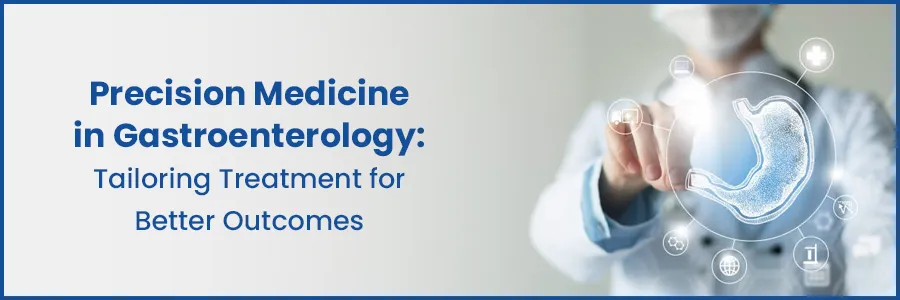- Cardiology 84
- Dermatology 45
- Endocrinology 33
- ENT 16
- Fertility 190
- Gastroenterology 78
- General-Medicine 81
- Gynecology 80
- Hematology 19
- Infectious-Diseases 33
- Neurology 52
- Oncology 34
- Ophthalmology 23
- Orthopedics 69
- Pediatrics 31
- Procedure 23
- Public-Health 144
- Pulmonology 59
- Radiology 8
- Urology 68
- Wellness 161
- Woman-and-child 77

Precision Medicine in Gastroenterology
In recent years, the field of medicine has witnessed remarkable advancements driven by cutting-edge technologies and innovative approaches. One such groundbreaking concept that has gained prominence is precision medicine.
Precision medicine, with its ability to customize medical care based on individual patient characteristics, is revolutionizing various medical specialities, including gastroenterology. This article delves into the realm of precision medicine in gastroenterology, exploring how tailored treatments are paving the way for improved patient outcomes.
Essence of Precision Medicine in Gastroenterology
Gastroenterology, the branch of medicine that focuses on the digestive system and its disorders, has traditionally relied on a one-size-fits-all approach to diagnosis and treatment.
However, the unique genetic makeup, lifestyle, and environmental factors of each patient can significantly influence how they respond to therapies. Precision medicine aims to address these individual variations by tailoring treatment plans to suit the specific needs of patients.
Precision Gastroenterology: Unleashing the Potential
The concept of precision gastroenterology involves integrating a patient's genetic information, molecular profiling, and clinical data to develop a comprehensive understanding of their condition. By analyzing this data, healthcare providers can identify specific biomarkers and genetic mutations that play a role in the development and progression of gastrointestinal disorders. This information is then used to design personalized treatment strategies that target the underlying mechanisms of the disease.
Advancing Diagnostics with Precision Medicine
Precision medicine in gastroenterology is revolutionizing the diagnostic landscape. Traditional diagnostic methods often involve a series of trial-and-error approaches, which can lead to delayed diagnoses and prolonged suffering for patients. Precision diagnostics, on the other hand, enable clinicians to identify diseases at an early stage and accurately differentiate between similar conditions.
For instance, colorectal cancer, a common gastrointestinal malignancy, can now be detected through precision screening techniques that analyze genetic markers associated with the disease. This approach allows for early intervention and improves the chances of successful treatment.
Precision Treatment Approaches
Precision medicine is transforming the treatment landscape by introducing targeted therapies that address the root causes of gastrointestinal disorders. Inflammatory bowel diseases (IBD) like Crohn's disease and ulcerative colitis have witnessed significant advancements in precision treatment.
Rather than relying solely on broad-spectrum medications, precision medicine enables the identification of specific molecular pathways responsible for inflammation. This knowledge enables the development of drugs that precisely target these pathways, minimizing side effects and optimizing therapeutic outcomes.
Enhancing Patient Outcomes
One of the primary goals of precision medicine in gastroenterology is to enhance patient outcomes. By tailoring treatment plans to individual patients, healthcare providers can optimize the effectiveness of interventions while minimizing adverse effects. This approach has the potential to improve patient quality of life, reduce hospitalizations, and increase overall treatment success rates.
Challenges and Future Directions
While precision medicine holds immense promise, its integration into gastroenterology is not without challenges. The collection and analysis of extensive patient data require advanced technological infrastructure and robust data privacy measures.
Additionally, the high costs associated with genetic profiling and targeted therapies can limit widespread adoption.
Conclusion:
Precision medicine is reshaping the landscape of gastroenterology by offering tailored treatment solutions that cater to each patient's unique characteristics. As our understanding of the molecular mechanisms underlying gastrointestinal disorders deepens, precision gastroenterology will continue to pave the way for more effective, efficient, and personalized care.
By harnessing the power of precision medicine, gastroenterologists are ushering in a new era of medical practice that holds the promise of better outcomes and improved quality of life for patients around the world.
Your health is everything - prioritize your well-being today.
Schedule Your AppointmentFrequently Asked Questions
Traditional approaches in gastroenterology often rely on general treatment strategies for various patients. Precision medicine, on the other hand, takes into account individual patient factors to design personalized treatment plans.
Precision medicine has shown promising results in treating conditions like inflammatory bowel diseases (IBD), colorectal cancer, irritable bowel syndrome (IBS), and liver diseases.
Genetic information is analyzed to identify specific biomarkers and genetic mutations associated with gastrointestinal disorders. This information helps healthcare providers understand the underlying mechanisms of diseases and develop targeted treatments.
Yes, precision medicine enables early diagnosis by identifying genetic markers and molecular profiles associated with diseases. This allows for timely intervention and improved prognosis.
Precision medicine allows for the identification of genetic markers that indicate a predisposition to colorectal cancer. This helps in early detection and monitoring of high-risk individuals.
Yes, precision medicine has led to the development of targeted therapies that focus on specific molecular pathways involved in gastrointestinal disorders. This approach minimizes side effects and enhances treatment effectiveness.
Precision medicine in IBD involves identifying the specific molecular pathways responsible for inflammation in each patient. This information guides the development of therapies that directly target these pathways.
Precision medicine can identify genetic markers associated with higher disease risk, enabling proactive measures to prevent or mitigate the development of gastrointestinal disorders.
Patients can experience better treatment outcomes, reduced side effects, improved quality of life, and a higher likelihood of successful disease management through personalized treatment plans.
Healthcare providers can stay informed by attending medical conferences, participating in continuing education, and engaging with professional networks focused on precision medicine and gastroenterology.

- Cardiology
- Case Studies
- Dermatology
- Endocrinology
- ENT
- Fertility
- Gastroenterology
- General
- General-Medicine
- Gynecology
- Hematology
- Infectious-Diseases
- Medical News
- Neurology
- Oncology
- Ophthalmology
- Orthopedics
- Pediatrics
- Procedure
- Public-Health
- Pulmonology
- Radiology
- Second Opinion
- Urology
- Wellness
- Woman-and-child